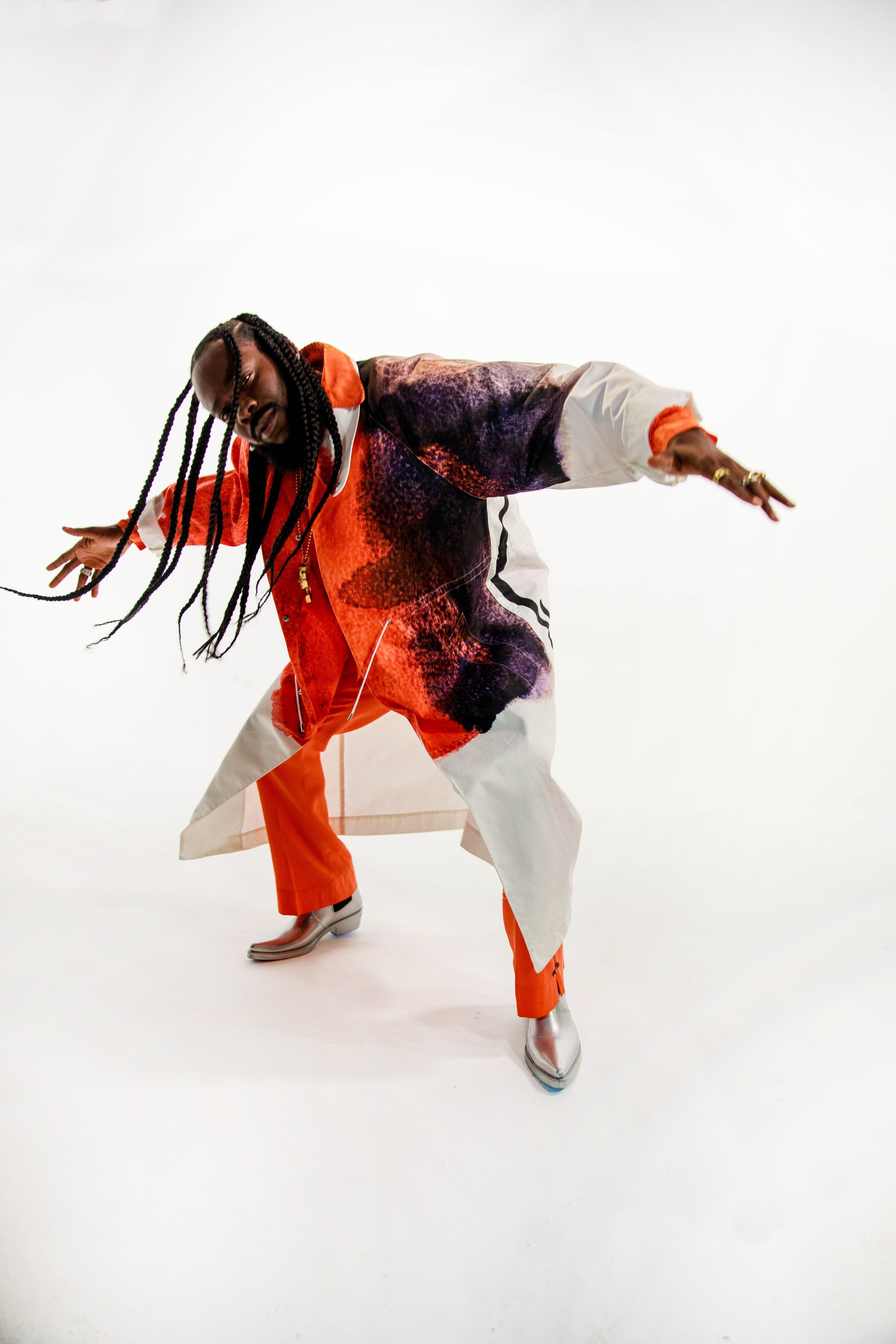Adekunle Gold isn’t looking over his shoulder as Afropop storms the world
In the video for Pick Up, Adekunle Gold is stunned by a portrait of his gilded self on a phantom Forbes cover. It’s an exciting vision of the riches he hopes to bank in his fledgling music career.


In the video for Pick Up, Adekunle Gold is stunned by a portrait of his gilded self on a phantom Forbes cover. It’s an exciting vision of the riches he hopes to bank in his fledgling music career.
Pick Up, one of 15 songs on Gold’s eponymous debut album, is now six years old, old enough in music’s current TikTok and streaming-driven age to be seen as being of a different era. Two other albums have followed yet no real life Forbes cover, but who’s keeping track, eh? You can count artists who have one on one hand: Billionaire Kanye, yes. Billionaire Rihanna, nope. What really matters to Gold is peace of mind and being immersed in the love of his fellow artist wife, Simi, and their child Adejare.
But make no mistake, this 35-year-old former graphic designer for Nigerian e-commerce companies knows he’s in a golden age of African music, one he has helped define with other world-conquering Afrobeats acts like Wizkid, and Davido. And so Gold releases Catch Me If You Can, his fourth album, today (Feb. 4) with American and British hip hop features that amplify Africa’s moment, while holding on to a distinct Afropop signature that insists on diversity.
Afrobeats can be an oversize umbrella for African music
Wizkid and Tems’s Essence became a chart-topping song in 2021 despite having been released the year before. It became a Billboard Hot 100 hit after Justin Bieber jumped on a remix. Burna Boy, and Tiwa Savage are other artists who diffuse Afrobeats through barbershops into millions of households around the world, thanks to their many award-winning hits over the years.
🎧 For more intel on Africa’s music industry, listen to the Quartz Obsession podcast episode on Afrobeats. Or subscribe via: Apple Podcasts | Spotify | Google | Stitcher.
That said, western acclaim for African art tends to create a single story of what successive cohorts of that art should be. It happens with literature where African writers are judged through (the few) works elevated with awards, leading some writers to advocate abolishing ‘African literature’ as a category. Music too risks doing the same through platform algorithms that curate Africans under monolithic categories on the basis of a few tastes, commanding creative conformity from artists who would rather do something else.
Variety on the west African music scene has always existed with understated veterans like Asa, and Fally Ipupa but it is even more today with an active alté community. Same with the rest of Africa with South Africa’s Amapiano, a form of house music.
Can artists adjust without conforming to trends?
Gold broke out in 2015 with Sade as a folksy singer. His signature is “feel-good music with good writing and a story,” says Edwin Madu, a Nigerian artist who has written songs for Gold. “You could call it Afropop if you want.”
Catch Me If You Can includes Afrobeats tunes like Mercy, High (featuring Davido) and Sinner. Indeed, Gold describes everything about this project as being different from the last three. But it’s a reflection of his current adventure as an artist, not a submission to a certain brand of African music as the only one that sells internationally. “Any adjustment to my art is based on how I feel, not about trends, but you learn new things everyday about how to sell it, new ways to put your music out.”
“If you think about music as a business, it’s a market with different selling brands. I own my space in my lane, and I’m good. I’m making money.”
Keeping an eye out for the TikTok-powered generation
This market and the money to be made in it seems to be expanding each year. Spotify became available in 38 African countries last year, joining platforms like Transsion-backed Boomplay, Apple Music, and Youtube’s product. These platforms want to take advantage of a new generation of artists staking a claim for the African music industry’s throne.
Besides Wizkid, CKay was 2021’s other global sensation from Africa with Love Nwantiti (released in 2019) finding new audiences on TikTok and becoming a hit through Shazam. Ed Sheeran jumped on Fireboy DML’s Peru and magnified the original song’s reach. Gold has released or featured in over 100 songs in 7 years as an artist but is he anxious about the storm of new arrivals?

“I am super proud of them. I like how they just go and don’t care. They don’t over-process like a lot of people my age do. They just say what’s on their minds and it’s working for them, so I am proud of them and there is no reason to look over my shoulders at all.”
Madu thinks experienced artists should be looking to work with these new voices. “Davido is never going to be out of style. He may not drop an album for two years but you are almost certain that one new breakout single is going to feature him. So Davido just needs to drop a fire verse six or seven times a year and he is in all of our playlists.”
Managed by Platoon, a London-based company owned by Apple, Gold doesn’t think he needs a big collaboration to cross over internationally, only that he wants to fulfil a dream of making music with Bruno Mars.
“First because I am a huge fan of his, and then I know the music will bang. But I won’t do it because it will take me to a whole new level. I am a king on my own. I’m good.”
Sign up to the Quartz Africa Weekly Brief here for news and analysis on African business, tech, and innovation in your inbox.